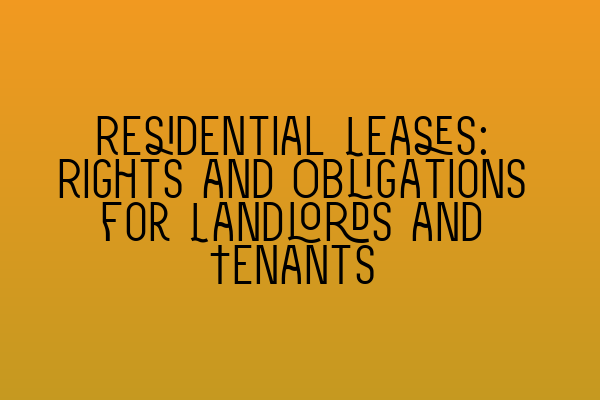Residential Leases: Rights and Obligations for Landlords and Tenants
If you are a landlord or a tenant involved in a residential lease agreement, it is vital to understand your rights and obligations. A residential lease is a legally binding contract that outlines the terms and conditions of a rental property, protecting both the landlord and the tenant. In this blog post, we will explore the key rights and obligations that landlords and tenants should be aware of, ensuring a smooth and harmonious living arrangement.
1. Duration of the Lease:
The duration of a residential lease is typically agreed upon by both parties. It can be for a fixed term, such as six months or one year, or it can be periodic, with no fixed end date. The lease agreement should clearly state the start and end dates, providing clarity on when the tenancy begins and when it terminates. Landlords and tenants should ensure they understand the agreed-upon duration to avoid any misunderstandings.
2. Rent Payment:
One of the fundamental obligations for the tenant is to pay rent promptly and in full accordance with the terms and frequency specified in the lease agreement. It is the landlord’s right to receive the rent on time and in the agreed-upon manner. Tenants should keep a record of their rental payments, including receipts or bank statements, to demonstrate compliance if any disputes arise.
3. Maintenance and Repairs:
Both landlords and tenants have responsibilities when it comes to property maintenance and repairs. Landlords are obligated to ensure that the property is in a habitable condition and to make any necessary repairs to keep it in good order. Tenants, on the other hand, are responsible for reporting any maintenance issues promptly and for taking reasonable care of the property. This includes basic cleanliness, avoiding damage, and avoiding actions that may create a hazardous condition.
4. Access and Entry:
Landlords have the right to access the property for reasonable purposes, such as conducting inspections, repairs, or emergency maintenance. However, they must provide reasonable notice to the tenant before entering the premises, unless it is an emergency situation. Tenants have the right to enjoy peaceful and uninterrupted possession of the property, so landlords should respect these rights and provide proper notice.
5. Right to Privacy:
Privacy is a crucial aspect of any residential lease agreement. Tenants have the right to privacy within their rented property, which means that landlords should not intrude excessively or without proper justification. Landlords should obtain consent before entering the property, except in emergencies or situations explicitly outlined in the lease agreement.
6. Termination and Renewal:
Both landlords and tenants have rights concerning the termination and renewal of a residential lease. Landlords have the right to terminate a lease if the tenant breaches the agreement or fails to pay rent. Tenants, on the other hand, generally have the right to terminate the lease with proper notice, usually specified in the lease agreement. It is essential for both parties to understand the termination and renewal terms outlined in the lease to ensure compliance.
Conclusion:
Understanding the rights and obligations of landlords and tenants in residential lease agreements is crucial for creating a positive and lawful living arrangement. By adhering to these responsibilities, both parties can protect their interests and maintain a harmonious rental relationship.
If you are preparing for the SQE 1 or SQE 2 exams, be sure to check out our related articles and practice resources:
– SQE 1 Practice Exam Questions
– SQE 1 Practice Mocks FLK1 FLK2
– SQE 2 Preparation Courses
– SQE 1 Preparation Courses
– SRA SQE Exam Dates
At SQE Property Law & Land Law, we provide expert legal services and resources to help you navigate the complexities of property law. Contact us today to learn more about how we can assist you with your property-related matters.
